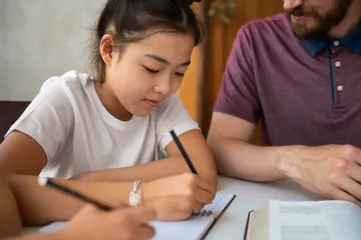Study Skills
Study skills are the tools and techniques that transform passive reading into active learning, helping your teen actually understand and remember what they study instead of just going through the motions.
Why study skills can be a problem
Many teens were never explicitly taught how to study. They default to ineffective methods like rereading notes or highlighting everything, then wonder why they bomb tests despite hours of "studying."
Common struggles:
• Reading the same page five times and remembering nothing
• Spending hours "studying" but failing tests
• Not knowing how to start studying or what to focus on
• Cramming the night before and forgetting everything after
• Taking notes that are useless for reviewing
• Feeling overwhelmed by the amount of material
Without proper study skills, your teen works harder, not smarter. They spend exhausting hours with minimal results, leading to frustration, poor grades, and the false belief that they're "just not smart enough."
You're not alone
If your teen's study method is staring at their notes hoping information will magically stick, they're in good company. Research shows most students use ineffective study methods because they've never been taught alternatives. Schools teach content but rarely teach how to learn that content. Parents often can't help because study methods have evolved since their school days. The encouraging news is that effective study skills can be learned at any age, and even small improvements in technique can lead to significant grade improvements.
What it looks like day to day
Student
Your teen highlights every sentence in their textbook in five different colors but can't explain what any of it means when asked.
Parent
You watch your teen "study" for three hours, which consists of having a textbook open while scrolling their phone, then claiming they studied all evening.
Tiny steps to try
Replace passive studying with active techniques that actually build understanding and memory.
- 1
The teaching test
Have your teen explain concepts to you as if you know nothing. If they can't teach it simply, they don't understand it yet. Teaching forces active processing.
- 2
Pomodoro technique
Study for 25 minutes, break for 5. After 4 rounds, take a longer 15-minute break. This maintains focus and prevents burnout.
- 3
Practice testing
Create flashcards or practice questions. Testing yourself is more effective than rereading. The effort of retrieving information strengthens memory.
- 4
Chunk and connect
Break large topics into smaller chunks. Connect each chunk to something already known. Our brains remember connections better than isolated facts.
- 5
Study environment audit
Remove distractions, have good lighting, and keep supplies ready. A consistent study space triggers the brain to enter learning mode.
Why study skills matter
Effective study skills are the foundation of academic success and lifelong learning. They teach teens how to process information actively, think critically, and manage their learning independently.
Research consistently shows that active learning techniques like retrieval practice and spaced repetition are far more effective than passive methods like rereading or highlighting. Yet most students default to these ineffective methods because they feel easier in the moment, even though they require more total time for worse results.
Ready to help your teen thrive?
Get personalized 1-on-1 coaching to build better habits and boost grades. Join 10,000+ families who trust Coachbit.
Frequently Asked Questions
Which study method is best?
There's no single best method because different techniques work for different types of material and learners. However, research consistently shows active methods (practice testing, teaching others, creating connections) outperform passive methods (rereading, highlighting, copying notes). The key is having a toolkit of strategies and knowing when to use each one.
How long should my teen study?
Quality matters more than quantity. Focused 25-minute sessions with breaks are more effective than unfocused three-hour marathons. Most teens can maintain deep focus for 25-45 minutes before needing a break. Regular shorter sessions throughout the week beat cramming. Aim for consistent daily practice rather than marathon weekend sessions.
Related Terms
Active Learning
Active learning is engaging with material through doing, discussing, and applying rather than passively reading or listening, leading to deeper understanding.
Metacognition
Metacognition is thinking about your thinking - understanding how you learn best, monitoring your comprehension, and adjusting strategies accordingly.
Note-Taking Strategies
Note-taking strategies are systematic methods for capturing, organizing, and reviewing information to enhance understanding and retention.
Test Preparation
Test preparation is the systematic approach to studying and reviewing material to perform well on exams, including strategies for different test formats.
Time Management
Time management is the ability to plan, prioritize, and use time effectively to accomplish tasks and meet deadlines without constant crisis.
Related Articles

Study Skills for High Schoolers – Mastering Note-Taking
Study strategies are vital to supporting high schoolers in their learning. Organized note-taking can provided a deeper understanding of subject material.
Read article
3 Tips to Help Your Child Focus on Homework
Kids struggle to focus and are easily distracted because their brains are undergoing rapid development. There are effective tools to improve concentration and focus in kids.
Read article
